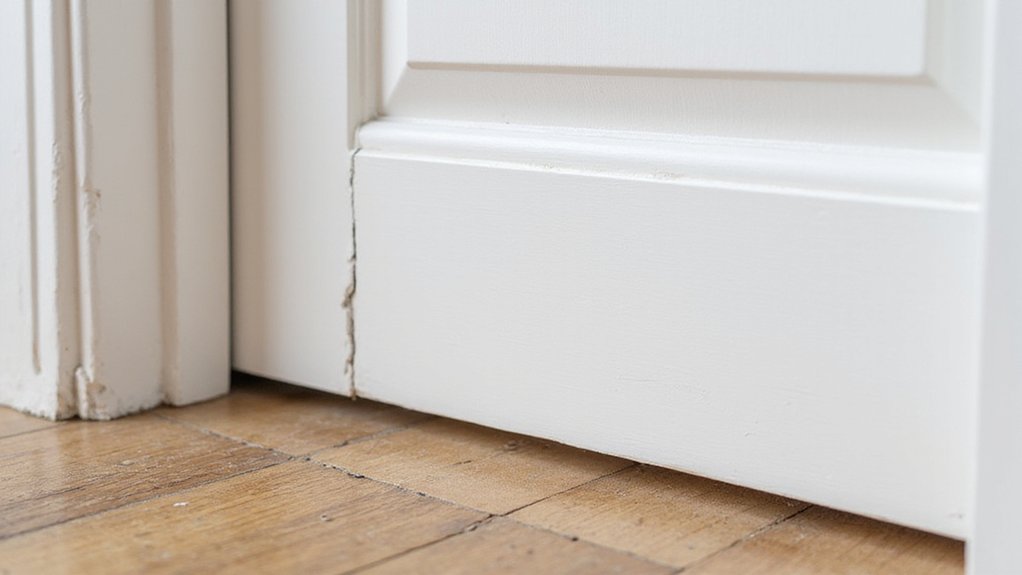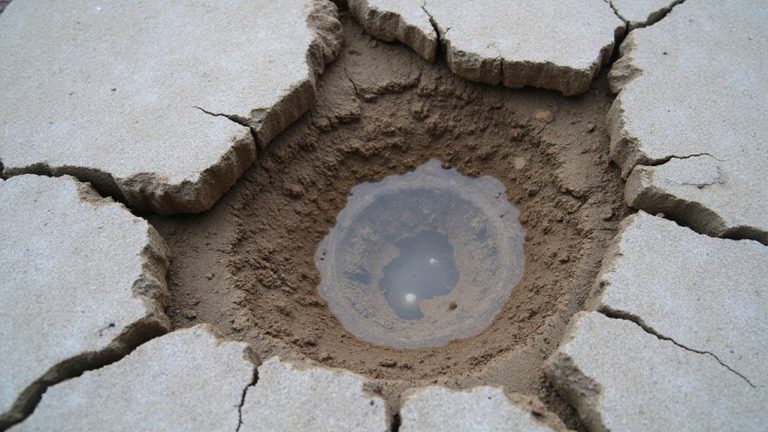Have you noticed your doors struggling to close or windows feeling stiff when you try to open them? These aren't just minor annoyances—they could be warning signs of a serious foundation problem. Your home's structural integrity might be at risk, with shifting soil or moisture changes causing unseen damage. Before you dismiss these symptoms, understand that early detection can save you thousands in potential repairs. Want to know what's really going on beneath your floors?
Understanding Foundation Movement and Its Impact
Foundation movement is a common yet often misunderstood phenomenon that can vastly affect your home's structural integrity. Changes in soil moisture levels can cause the ground beneath your home to expand or contract, putting significant stress on your foundation.
When your drainage system effectiveness is compromised, water accumulation or poor runoff can intensify these shifts. This subtle but forceful movement creates uneven pressure, causing walls to warp and creating noticeable symptoms like sticking doors and windows.
Understanding these fluid dynamics helps you recognize potential foundation issues early, potentially saving you from costly repairs and maintaining your home's stability and comfort. In Detroit, foundation drainage solutions can help mitigate these structural challenges by addressing water management around your home's foundation.
Common Causes of Structural Shifts
Having investigated how soil moisture and drainage can impact your home's foundation, let's examine the specific factors that trigger structural shifts. Soil erosion patterns and moisture content variations play integral roles in foundation movement.
When the ground around your home experiences uneven water absorption or loses stability, your foundation can start to sink or tilt. Clay soils are especially vulnerable, expanding when wet and contracting when dry. These dramatic changes create stress on your home's structural integrity, causing doors and windows to stick, floors to slope, and walls to crack. Foundation wall bowing can occur when external soil pressure builds up, potentially leading to significant structural damage if left unaddressed.
How Soil Conditions Affect Home Stability
Nearly every homeowner will encounter soil-related challenges that can compromise their property's structural integrity. Soil erosion patterns and groundwater fluctuations can notably impact your home's foundation, causing unexpected shifts and stress.
When soil moisture changes drastically, it expands and contracts, creating pressure against your foundation walls. This movement can lead to foundation settlement, which causes windows and doors to stick, cracks in walls, and uneven flooring.
Understanding these soil dynamics helps you identify potential problems early, protecting your home's stability and preventing costly repairs down the line.
Recognizing Early Warning Signs of Foundation Damage
When cracks start appearing around your home, they might be more than just cosmetic issues—they could signal serious foundation problems. Moisture intrusion and soil erosion can cause subtle shifts that compromise your home's structural integrity.
You'll want to watch for signs like uneven floors, wall cracks, and doors or windows that suddenly stick when opening or closing. These symptoms often indicate underlying foundation damage that needs professional assessment. Don't ignore small changes; they can quickly become expensive repairs.
Early detection could save you thousands in potential restoration costs and protect your most prized possession.
The Connection Between Sticking Doors and Structural Issues
Why do sticking doors often signal more than just a minor inconvenience? They can be early warning signs of serious foundation problems.
When your home's foundation shifts, it creates uneven surfaces and sinking floors, causing doors and windows to misalign. You might notice difficulty opening or closing doors, unusual gaps around door frames, or visible tilting.
These aren't just frustrating quirks—they're potential indicators of underlying structural issues. If you're experiencing these symptoms, don't ignore them. Your home's foundation is its backbone, and catching problems early can save you significant repair costs and prevent more extensive damage down the road.
Professional Assessment and Diagnostic Techniques
Foundation experts can zero in on potential structural issues through detailed diagnostic techniques. When you're experiencing door and window problems, professionals will conduct an extensive condition evaluation to pinpoint the root cause.
Key diagnostic methods include:
- Laser level measurements
- Infrared thermal scanning
- Ground penetrating radar
- Soil moisture analysis
- Structural stress mapping
Their structural analysis helps you understand whether your home's foundation is shifting, settling, or experiencing critical stress. By identifying these issues early, you'll prevent more expensive repairs and protect your home's integrity.
Experts use specialized tools and years of experience to diagnose subtle foundation movements that might be causing your sticking doors and windows.
Repair Options and Cost Considerations
Homeowners can tackle foundation repair challenges by considering several strategic approaches that match their specific structural needs. Whether you're exploring do it yourself repairs or hiring a contractor, understanding your options is key.
Minor foundation issues might involve simple crack sealing or soil stabilization, which can cost between $500 and $3,000. More extensive repairs, like pier and beam reinforcement, could range from $5,000 to $15,000. Your repair strategy depends on the severity of foundation damage, budget constraints, and long-term home stability goals. Professional assessments can help you make an informed decision that protects your most significant investment.
Preventative Maintenance Strategies for Homeowners
Staying ahead of potential foundation issues can head off costly repairs down the road. As a homeowner, you'll want to protect your investment through proactive strategies:
- Perform seasonal inspections of your home's foundation
- Monitor drainage around your property
- Keep soil moisture consistent
- Watch for early warning signs of foundation stress
- Schedule regular maintenance with professional contractors
Your home's stability depends on how carefully you manage potential risks. By performing consistent checks and addressing minor concerns quickly, you'll prevent larger, more expensive problems from developing. Regular maintenance isn't just about protecting your foundation—it's about preserving your home's long-term structural integrity and value.
Frequently Asked Questions
Can a Small Foundation Crack Lead to Serious Structural Damage?
Yes, a small foundation crack can escalate quickly. Soil moisture fluctuations and ground movement patterns can widen the crack, potentially compromising your home's structural integrity and leading to costly repairs.
How Much Does Foundation Repair Typically Cost for an Average Home?
Foundation repair costs typically range from $2,000 to $7,500. You'll want to investigate cost estimates and financing options to manage expenses and protect your home's structural integrity.
Will My Home Insurance Cover Foundation Movement and Related Repairs?
Your insurance policy might not cover foundation movement unless it's caused by sudden, accidental events. Have a professional home inspection first to understand potential coverage and recommendations for your specific situation.
Are Older Homes More Susceptible to Foundation Settlement Issues?
Yes, older homes are more vulnerable to foundation settlement due to soil composition changes and seasonal temperature shifts that gradually impact your home's structural integrity over decades of environmental stress.
Can I Fix Foundation Problems Myself or Must I Hire Professionals?
While some DIY methods exist, foundation issues are complex. You'll want a professional assessment first to understand the severity and potential risks before attempting any repairs yourself.



